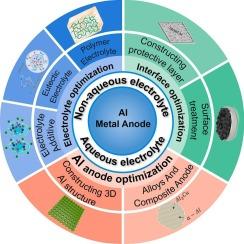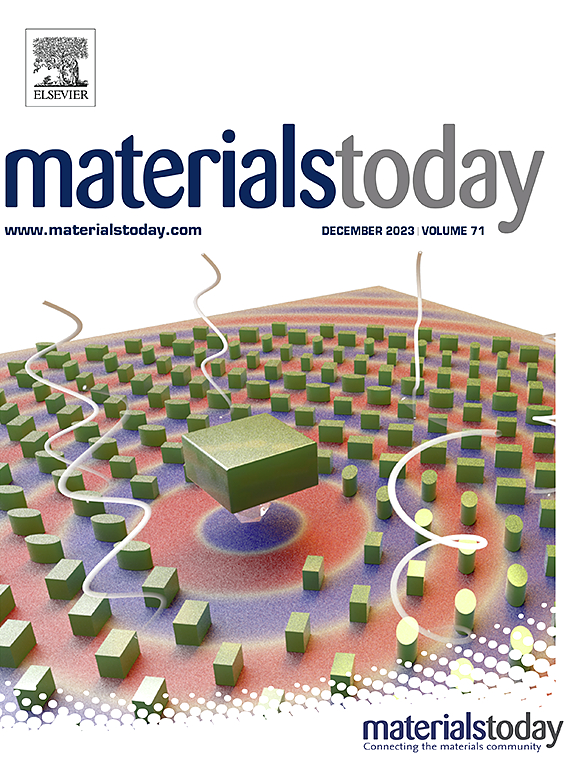在可充电铝离子电池中构建稳定铝金属阳极的挑战与策略
IF 22
1区 材料科学
Q1 MATERIALS SCIENCE, MULTIDISCIPLINARY
引用次数: 0
摘要
随着电动汽车市场的增长和可再生能源存储技术的发展,可充电铝离子电池(raib)因其丰富的自然资源、可观的理论容量和固有的安全优势而受到人们的极大关注。然而,金属铝阳极稳定性差,在离子液体电解质中存在自腐蚀和枝晶生长等问题,在水溶液中存在自腐蚀、表面钝化和析氢反应等问题,给金属铝阳极带来了巨大的挑战。本文综述了铝阳极在非水电解质和水电解质中面临的关键科学挑战,并概述了旨在稳定铝金属阳极的创新策略和最新进展。在总结和展望部分,我们对构建稳定的铝金属阳极提出了深刻的建议和未来的展望,从而推动高性能raib的发展。我们还特别关注了关于水铝离子电池的争议,并提出了一些合理的标准来证明水铝离子电池的可逆性。本文章由计算机程序翻译,如有差异,请以英文原文为准。

Challenges and strategies for constructing stable aluminum metal anodes in rechargeable aluminum-ion batteries
With the growing market for electric vehicles and the development of renewable energy storage technologies, rechargeable aluminum-ion batteries (RAIBs) have garnered significant interests because of the abundant natural resources, impressive theoretical capacity and inherent safety advantages. Nevertheless, the poor stability of metallic Al anode poses a formidable challenge, stemming from issues such as self-corrosion and dendritic growth in ionic liquid electrolyte, as well as self-corrosion, surface passivation and hydrogen evolution reaction in aqueous electrolyte. This comprehensive review delves into the key scientific challenges faced of Al anode both in non-aqueous and aqueous electrolytes, and subsequently outlines innovative strategies and recent progresses that aimed at stabilizing aluminum metal anodes. In summary and outlook part, we present insightful suggestions and future perspectives for constructing stable aluminum metal anodes, which could propel the development of high-performance RAIBs. Specially, we also concern the controversy about aqueous aluminum-ion batteries and propose some reasonable standards for proving the reversibility of aqueous RAIBs.
求助全文
通过发布文献求助,成功后即可免费获取论文全文。
去求助
来源期刊

Materials Today
工程技术-材料科学:综合
CiteScore
36.30
自引率
1.20%
发文量
237
审稿时长
23 days
期刊介绍:
Materials Today is the leading journal in the Materials Today family, focusing on the latest and most impactful work in the materials science community. With a reputation for excellence in news and reviews, the journal has now expanded its coverage to include original research and aims to be at the forefront of the field.
We welcome comprehensive articles, short communications, and review articles from established leaders in the rapidly evolving fields of materials science and related disciplines. We strive to provide authors with rigorous peer review, fast publication, and maximum exposure for their work. While we only accept the most significant manuscripts, our speedy evaluation process ensures that there are no unnecessary publication delays.
 求助内容:
求助内容: 应助结果提醒方式:
应助结果提醒方式:


